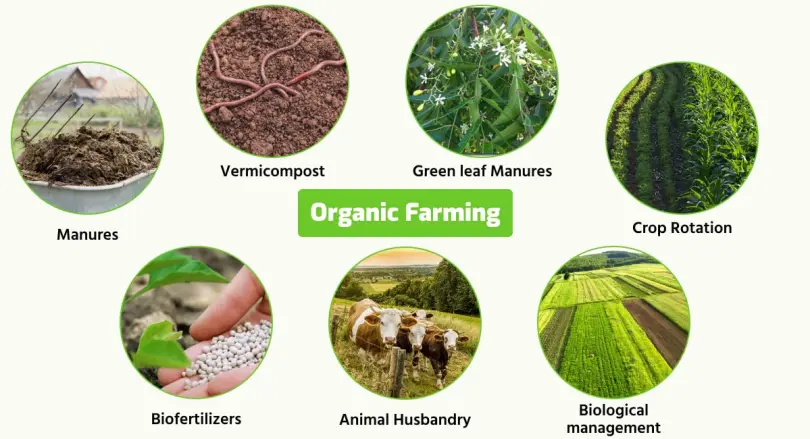Organic farming is gaining widespread attention across the globe as farmers, consumers, and policymakers recognize the urgent need for more sustainable agricultural practices. In India, organic farming is not a new concept—it has deep roots in our traditional practices, where natural methods have long been used to cultivate healthy crops and preserve soil fertility. In this blog, we explore what organic farming is, why it’s essential for our future, and how it promotes a healthier ecosystem, better food, and sustainable agribusiness.
What Is Organic Farming?
Organic farming is a method of agriculture that focuses on natural processes and avoids or minimizes the use of synthetic inputs like chemical fertilizers, pesticides, hormones, and genetically modified organisms (GMOs). It emphasizes the use of organic materials such as crop residues, farmyard manure, compost, green manure, and biofertilizers to enrich the soil and sustain crop productivity in an eco-friendly manner.
According to the USDA, organic farming is “a system which avoids or largely excludes the use of synthetic inputs and relies on crop rotations, crop residues, animal manures, off-farm organic waste, mineral grade rock additives, and biological systems for nutrient mobilization and plant protection.”
The FAO adds that organic agriculture is “a unique production management system that promotes and enhances agro-ecosystem health, including biodiversity, biological cycles, and soil biological activity,” all without using synthetic off-farm inputs.
The Need for Organic Farming
With the world population expected to exceed 9.5 billion by 2050, the pressure to produce more food sustainably is immense. In India, where agriculture is a livelihood for a large percentage of the population, the focus is shifting from quantity to quality and sustainability. While the Green Revolution significantly boosted food production, it also introduced an over-reliance on chemical inputs, leading to soil degradation, water contamination, and reduced biodiversity.
Organic farming presents a sustainable solution. As fossil fuel-based agrochemicals become costlier and environmentally damaging, returning to natural farming practices not only protects our ecosystems but also ensures long-term food security and economic resilience.
Key Characteristics of Organic Farming
Organic farming is not just about avoiding chemicals—it’s about working in harmony with nature. Some of its main principles include:
🌱 Soil Fertility: Maintaining long-term soil health by increasing organic matter, encouraging microbial activity, and minimizing soil erosion.
🌾 Natural Nutrient Management: Using crop residues, green manure, compost, and biofertilizers to provide nutrients to plants via natural biological processes.
🌿 Nitrogen Self-Sufficiency: Utilizing leguminous crops and biological nitrogen fixation, which reduces the need for synthetic nitrogen fertilizers.
🐛 Pest and Disease Control: Managing pests and diseases through crop rotation, intercropping, natural predators, resistant varieties, and biological control methods.
🐄 Animal Welfare: Promoting humane livestock management by addressing natural behavior, proper nutrition, and ethical breeding.
🌳 Environmental Stewardship: Minimizing the impact on the environment and actively conserving natural habitats and biodiversity.

Types of Organic Farming Methods
There are several schools of thought and practice in organic farming, each with its unique principles:
Organic Agriculture: Focuses on maintaining soil fertility through composting, crop rotation, and natural pest control.
Biodynamic Agriculture: Treats the farm as a self-sustaining organism and uses lunar cycles to guide agricultural practices.
Natural Farming: Popularized by Masanobu Fukuoka, this method encourages minimal human intervention and believes nature can grow food best on its own.
Permaculture & Biological Farming: These promote a holistic ecosystem approach and emphasize the use of biological pest control and recycling of nutrients.
Advantages of Organic Farming
✅ Healthier, Nutritious Food: Free from harmful chemicals, rich in nutrients, and better tasting.
✅ Sustainability: Maintains soil fertility, reduces pollution, and uses less energy.
✅ Enhanced Biodiversity: Organic fields support more diverse life forms, making ecosystems more resilient.
✅ Higher Profit Margins: Organic produce often fetches higher prices, supporting rural economies.
✅ Climate Resilience: Healthy soil and diverse crops make organic farms more adaptable to climate change.
Challenges of Organic Farming
While the benefits are significant, organic farming does face challenges:
❌ Lower Initial Yields: Especially during the transition from conventional to organic farming.
❌ Labor Intensive: Requires more knowledge and manual effort.
❌ Costlier Produce: Organic products can be more expensive for consumers, limiting accessibility.
Conclusion: The Future Is Organic
Organic farming in India holds immense potential to feed the nation while preserving its natural resources. It’s not just a farming method—it’s a commitment to the health of the soil, the wellbeing of communities, and the sustainability of future generations. As awareness grows and support systems improve, organic farming is poised to become the backbone of India’s sustainable agriculture movement.
